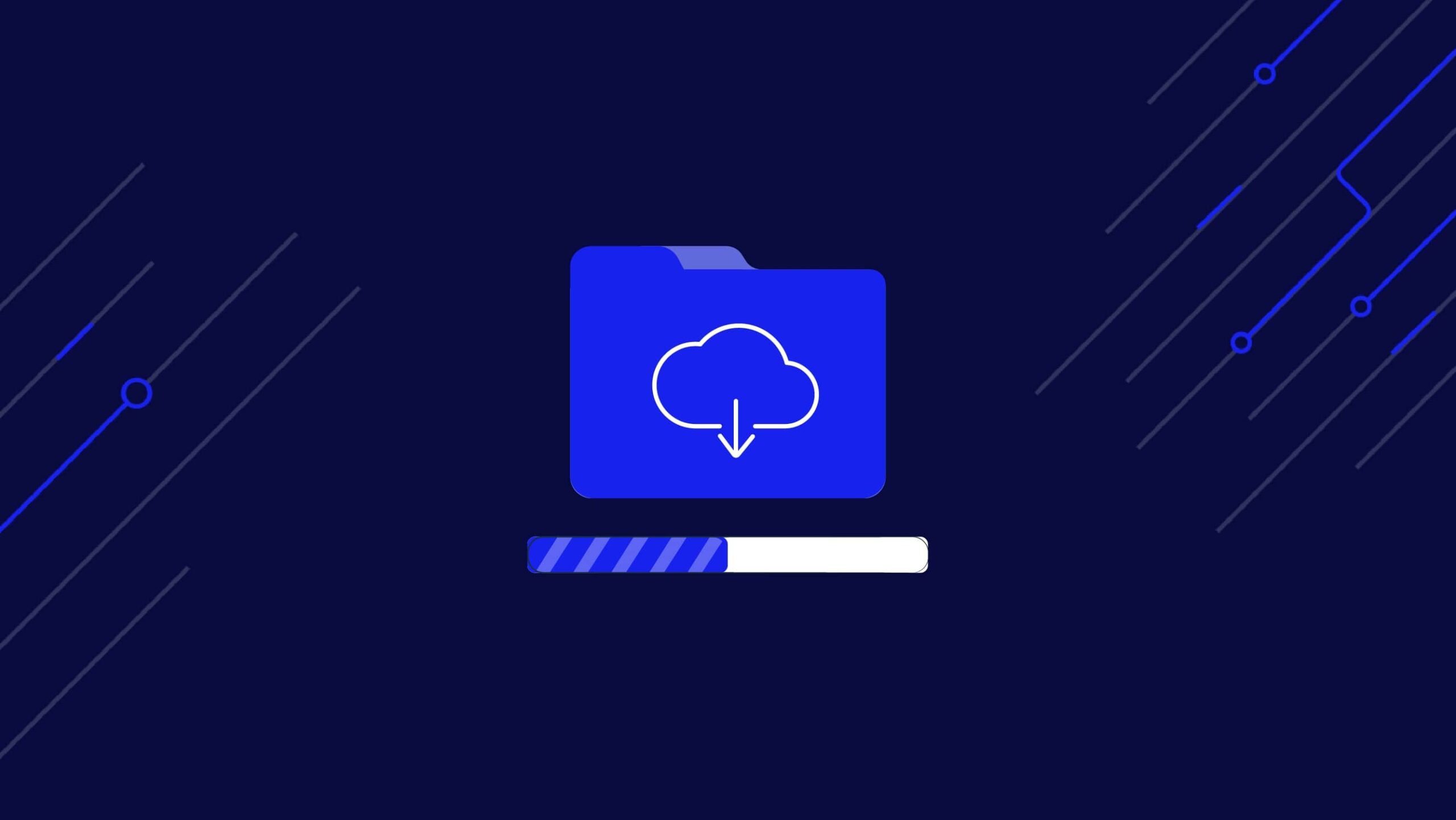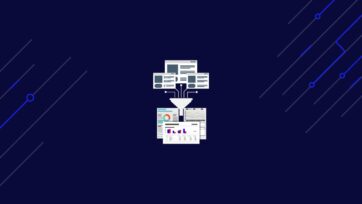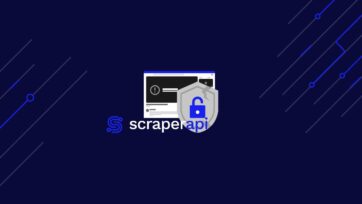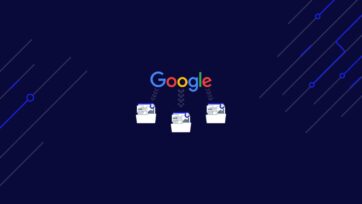Building and maintaining scrapers can be daunting, especially when you want to get data fast rather than setting up complex code infrastructure. From anti-bots and CAPTCHAs to evolving page blockers, scaling data collection and automation can feel like a never-ending struggle.
Using no-code scraping tools such as ScraperAPI removes the hassle, so you can scrape thousands of pages in a glimpse and get down to analyzing insights.
ScraperAPI reduces time to data by handling the technical complexities
Let’s explore how no code scraping can revolutionize a data collection process for engineering and data teams.
What Are No-Code Scrapers?
No-code scrapers and scraping, also known as managed or hosted scraping, is an approach to web scraping that helps you extract data from websites without the need to build or maintain your code infrastructure (which is often a time-consuming process — think of CAPTCHAs, anti-bot protection, and IP blocks).
With no-code scraping, the process is simplified and streamlined. You can upload your target URLs, use pre-built scraping templates for popular websites or common use cases, and get data almost instantly.
One of the core advantages of no-code scraping is that it significantly reduces the time and effort required to collect data from the web.
These tools eliminate the need for manual coding and handling infrastructure, so you can focus more on analyzing and deriving valuable insights from the extracted data.
Scale is another benefit no-code scrapers bring. For example, with ScraperAPI, you can schedule scraping using cron scheduling or custom intervals for higher automation and scale. That’s useful if you want to keep an eye on your competitors constantly — yes, they can change their prices and listing keywords daily, so you should keep up with these developments to stay competitive.
What to Consider When Choosing a No-Code Scraping Tool?
- Scalability — Ensure the tool can handle large-scale data extraction without compromising on performance
- Success rates — The tool should demonstrate high success rates so you can run your projects smoothly without getting blocked
- Scheduling — Look for options to automate scraping tasks on a predefined schedule
- Pre-made templates — Check structured data endpoints for Amazon and Google to get parsed data at scale.
- The interface and ease of use — A user-friendly interface allows even non-technical users to navigate the tool effortlessly
- Export formats and webhooks — Check if the tool can export data in formats like JSON or Excel. You should also be able to connect data exports with your applications or folders using webhooks
The Best No-Code Tools [Comparison]
So what is the right no-code scraping tool for your use case? We have compared the best no-code web scrapers based on the core features and intuitiveness of the user interface, evaluated their strengths, weaknesses, and prices, and compiled unbiased verdicts.
💡 Don’t have time to read the comparison; move to the final comparison table for a sneak peek at the winners.
1. ScraperAPI’s DataPipeline
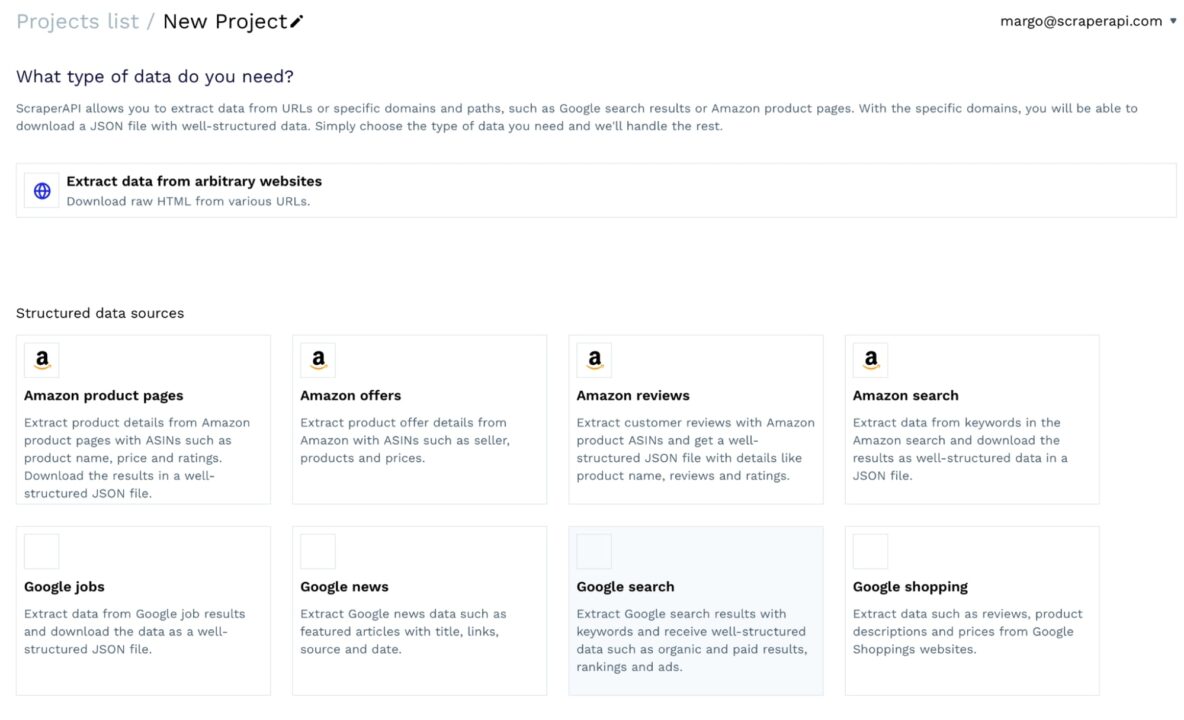
DataPipeline is a one-stop shop for web scraping that helps process large scraping projects, schedule scraping jobs, and run them on autopilot.
By using ScraperAPI, you no longer worry about website blockers, proxy rotation, and other technical issues — you just get the data you need quickly and at the scale you need.
You can also get structured data for the selected use cases, such as Amazon product data, reviews, Google Shopping, and more.
Core Features
- Structured data endpoints
- Rich parameters
- 99% success rate
- Scheduling options (including cron)
- Webhooks
Ease of Use
⭐⭐⭐⭐⭐
Pros & Cons
| Pros | Cons |
| 👍 Reliable data collection vendor | ❌ No CSV export yet |
| 👍 Scalable and fast | |
| 👍 Handles proxies, geolocation, and more | |
| 👍 Export in JSON format | |
| 👍 Cron scheduling and intervals | |
| 👍 Intuitive and clean interface | |
| 👍 Custom job success notifications | |
| 👍 Webhooks |
Pricing
| Hobby | Startup | Business | Professional | Enterprise | |
| API Credits | 100,000 | 1,000,000 | 3,000,000 | 14,000,000 | 10M+ |
| Price | $49/month | $149/month | $299/month | $999/month | Custom |
Verdict
ScraperAPI’s DataPipeline lets you automate scraping jobs with scheduling. It’s highly scalable because you can use a lot of concurrent threads for your scraping jobs to achieve high speed with large scraping projects.
With its rich library of templates, you can collect well-structured data in JSON that you can start using straight away (no more tedious parsing). You can also easily connect acquired data to your workflow — so you pump data at the right place, regularly, without much supervision.
2. Octoparse
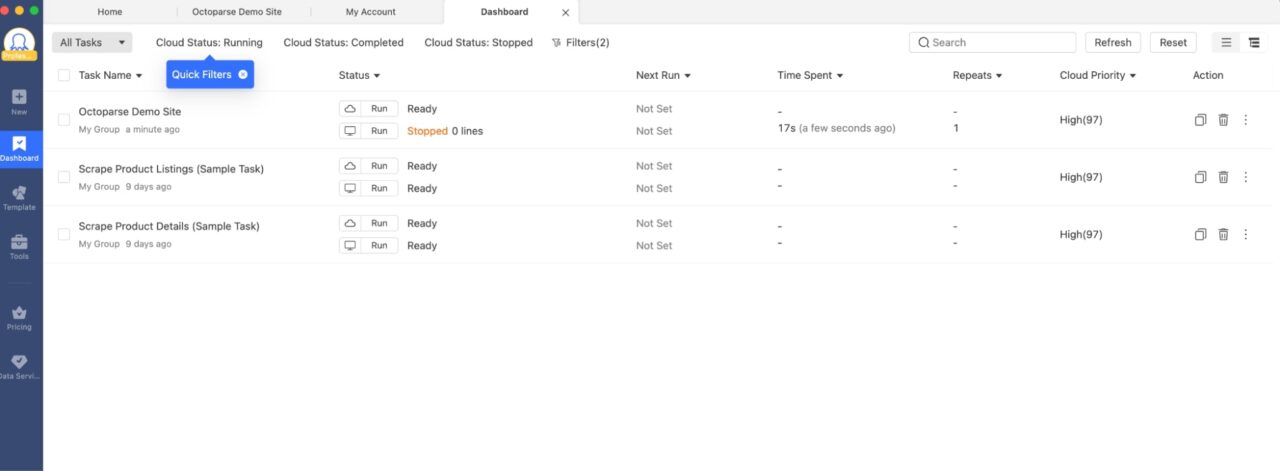
Octoparse is a no-code scraping agent that doesn’t require much technical expertise to get started. It offers many templates you can apply to your business case.
Once you run your project, you can choose to export in various formats, such as CSV, or send data to your database with a webhook.
However, the tool’s pricing can quickly eat your budget (compared to other similar tools), especially if you want to achieve high speed with concurrent requests and use proxies to avoid IP bans – to mention a few.
Core Features
- Preset templates
- RPA console
- Event log
- Concurrent runs
Ease of Use
⭐⭐⭐
Pros & Cons
| Pros | Cons |
| 👍 Can export data anywhere | ❌ Can encounter glitches |
| 👍 Various export option | ❌ Cluttered interface |
| 👍 Automatic cleaning with RegEx tool | ❌ Scheduling option can’t be applied at the time of setting up scraping |
| 👍 Structured data in CSV | ❌ Extra charges for various addons |
Pricing
| Free | Standard | Professional | Enterprise Plan | |
| Tasks | 10 | 100 | 250 | 750+ |
| Price | – | $89/month | $249/month | Custom |
Verdict
While Octoparse positions itself as an easy-to-use, no-code scraping tool, it gets tricky to download and set up its app after signing up for a trial – which you wouldn’t realize was an app before you sign up.
On the other side, It has various templates that let you extract well-structured data in a CSV file. It can be a good solution for beginners, but if you are more advanced and need to scale, you can quickly face the wall with the available plans.
3. Phantombuster

Phantombuster is a no-code web scraper designed for marketing and sales teams that want to improve their lead generation workflow, source new leads from social media websites, and enrich their CRM with missing lead information.
While this no-code solution is easy to use, its use cases are limited — the tool is largely focused on lead generation.
Core Features
- Workflows (templates)
- Data and email enrichment
- Social media scraping and automation
- Exports in JSON and CSV
Ease of Use
⭐⭐⭐⭐
Pros & Cons
| Pros | Cons |
| 👍 Great fit for sales and marketing pros | ❌ No concurrent threads make it slow |
| 👍 Exports both in JSON and CSV | ❌ Mostly for lead generation |
| 👍 Templates to fit your business case | ❌ No scheduling |
Pricing
| Trial | Starter | Pro | Team | |
| Execution Time | 2hrs and 1K credits per month | 20hrs and 10K credits per month | 80hrs and 30K credits per month | 300hrs and 90K credits per month |
| Execution Time | Free | $69/month | $159/month | $439/month |
Verdict
Phantombuster is a great codeless web scraping tool that is well-suited for sales and marketing professionals who focus on collecting data for lead generation.
You don’t need any technical skills to start scraping. However, if you plan to scrap on a large scale, you won’t likely achieve the scale you are looking for, as there are certain limits to the speed of scraping for social media channels.
4. Apify
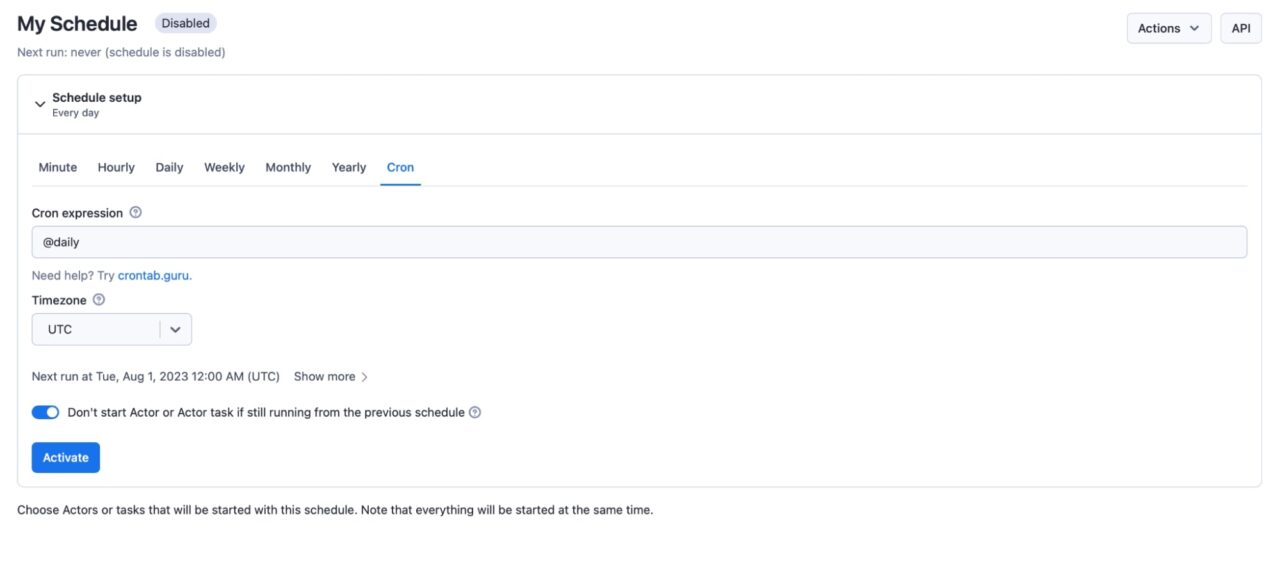
Apify offers an intuitive user interface for no-code scraping. After signing up, you can use an extensive library of templates. There is a huge flexibility in scheduling your scraping jobs and setting timeouts.
However, some users have shared their concerns about how the software charges them (often unexpectedly) and its poor effectiveness for some domains.
Core Features
- Pre-built templates
- Scraping schedules
- Structured data exports
- JSON, CSV, Excel, HTML exports
Ease of Use
⭐⭐⭐⭐⭐
Pros & Cons
| Pros | Cons |
| 👍 Intuitive dashboard and simple setup | ❌ Success rates for some domains are low |
| 👍 Rich library to fit your use case | ❌ Actors get stuck increasing billing |
| 👍 Able to reach large scale and speed | ❌ Can be expensive compared to other tools |
Pricing
| Free | Starter | Scale | Business | Enterprise | |
| Compute Units | 10 CUs | 100 CUs | 500 CUs | 1000 CUs | Custom |
| Price | Non Monthly + $0.4/extra CU | $49/month + $0.4/extra CU | $499/month + $0.3/extra CU | $999/month + $0.25/extra CU | Custom |
Verdict
Apify is one of the most advanced no-code solutions. You will most likely scrape the right data for your use case. However, be cautious of the pricing (the tool can quickly become expensive, especially if you aim at a huge scraping scale).
5. BrightData
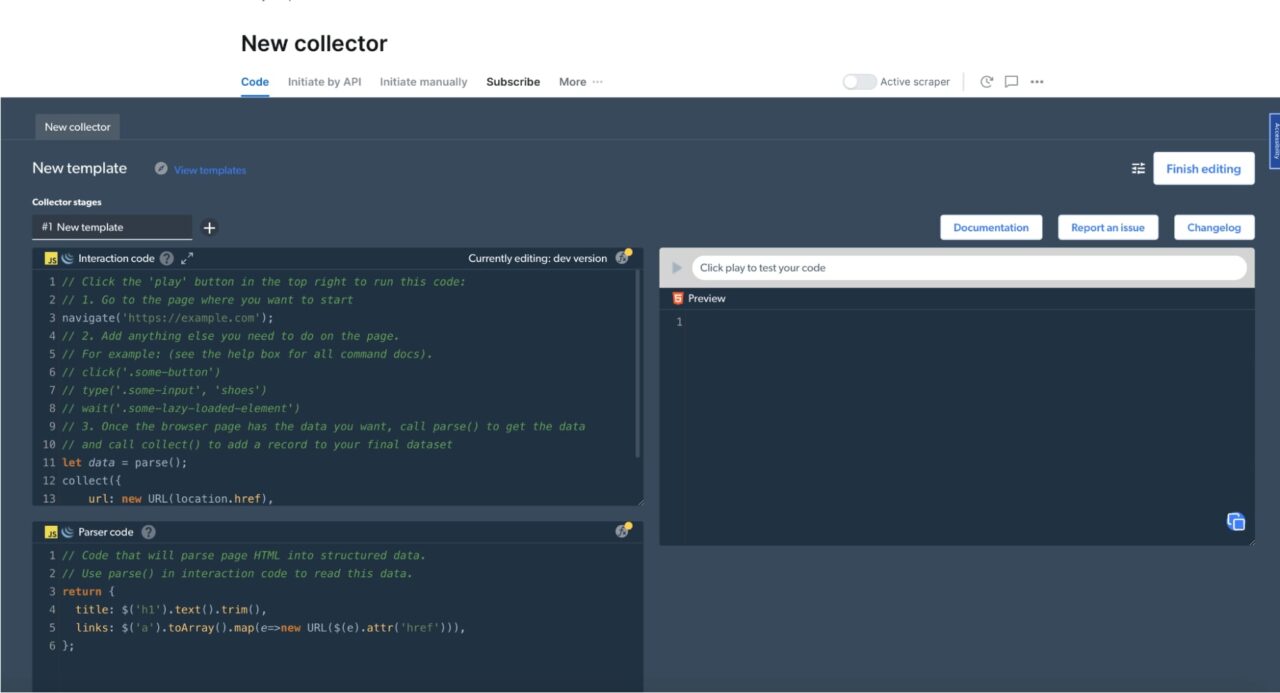
BrightData’s Web Scraper IDE is a hosted solution that offers a range of templates you can use to avoid building code from scratch.
While it lets you cut the costs you’d otherwise spend on proxy providers and storage, it’s not entirely a tool for those without Javascript knowledge, making it closer to a low-code solution than true no-code.
BrightData offers similar options to other no-code solutions, but it’s more difficult to navigate.
Core Features
- Templates
- Autoscaling
- Auto-retry
- Alerts
Ease of Use
⭐⭐⭐⭐
Pros & Cons
| Pros | Cons |
| 👍 Customizable code | ❌ Requires code tweaking |
| 👍 Scheduling | ❌ Limited templates |
| 👍 Possible to preview | |
| 👍 Easy parser creation |
Pricing
| Pay as You Go | Growth | Business | Enterprise | |
| Price | – | $500/month | $1000/month | Custom |
| Cost per CPM | $4/CPM | $3.06/CPM | $2.70/CPM | Custom |
| Headless Browser Cost | $8/CPM | $6.12/CPM | $5.40/CPM | Custom |
Verdict
While Brightdata provides you with various templates, it’s not entirely a no-code tool. You can host your code and scrape using BrightData infrastructure, but you must still cope with code-related tasks within their interface.
Also, the tool offers fewer opportunities to adapt to your business needs and limited templates.
6. Smartproxy

Smartproxy is a no-code solution that lets you choose premade templates, schedule your scraping jobs, and download results in JSON and CSV formats. Currently, Smartproxy offers only two core scraping templates — Amazon and Google. You can also use its extension to scrape other websites using your browser.
Core Features
- Scheduling
- JSON & CSV export
- Amazon and Google scraping templates
Ease of Use
⭐⭐⭐⭐
Pros & Cons
| Pros | Cons |
| 👍 Connects to your workflow | ❌ Glitches when scraping through the dashboard |
| 👍 Simple setup | ❌ Limited templates |
| 👍 Adjustable export options | |
| 👍 Access to structured data |
Pricing
No-code scraper module: from $50/month (includes 13k requests)
Verdict
Smartproxy aims to make scraping easy through its dashboard and various features. However, it doesn’t always work perfectly.
After creating a collection, our project didn’t start generating requests, there were no notifications in the dashboard about the success or failure of the project. Contacting support didn’t resolve the issue.
7. Parsehub
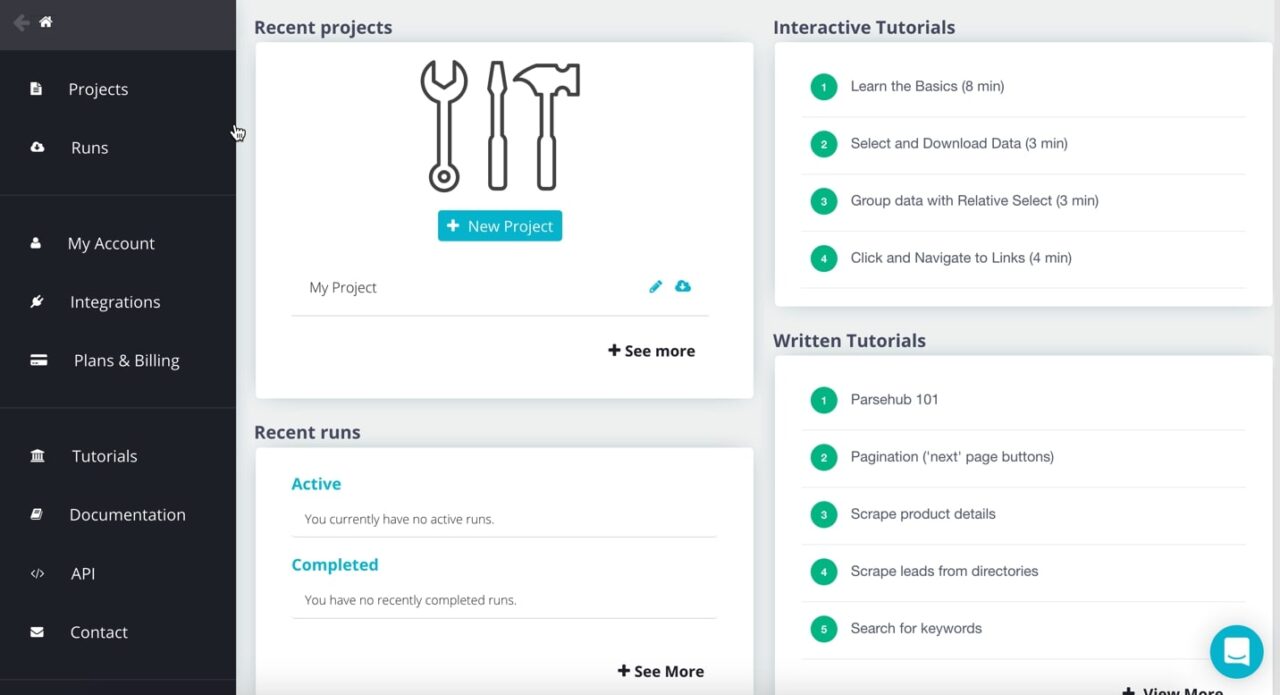
Parsehub is a web scraping desktop application that lets you extract data from any page on the web by selecting its visual elements. Parsehub can be a good solution for simple scraping jobs. However, you might struggle with complex anti-bot protection mechanisms on various pages.
Core Features
- Automatic data collection & storage
- Scheduled collection
- Google Sheets and Tableau exports
- Real-time Google Sheets
Ease of Use
⭐⭐⭐
Pros & Cons
| Pros | Cons |
| 👍 Doesn’t require any technical knowledge | ❌ Collects data behind login (can be incompatible with privacy regulations) |
| 👍 Can help achieve scale | |
| 👍 Structured data |
Pricing
| Free | Standard | Professional | Plus | |
| Projects and Page Limits | 5 projects + 200 pages/run | 20 projects + 10,000 pages/run | 120 projects + unlimited pages/run | Custom |
| Price | – | $189/month | $599/month | Custom |
Verdict
You can use Parsehub only after installing its desktop application. You can’t just copy and integrate an API key into your coding infrastructure.
It might be difficult to extract data at scale as you must go from one page to another and manually select the information you’d like to scrape. However, this scraper can be a good option for total beginners in web scraping.
8. Simplescraper

Simplescraper is a cloud scraping tool that lets you extract data from anywhere and seamlessly integrate it with the apps you are using.
With this tool, you can scale your data scraping processes, but get ready to pay for the enterprise account immediately, as the highest plan offers only 40,000 credits.
Core Features
- Workflows (templates)
- Webhooks
- Deep scraping
- Real-time Google Sheets
Ease of Use
⭐⭐⭐⭐
Pros & Cons
| Pros | Cons |
| 👍 Selecting templates that fit your case | ❌ No cron scheduling |
| 👍 Sending output file anywhere you want | ❌ Downloading a desktop app is required |
| 👍 Simple data visualization |
Pricing
| Free | Plus | Pro | Premium | |
| Credits | 100 | 6000 | 15000 | 40000 |
| Price | – | $35/month | $70/month | $150000 |
Verdict
You can scale your data scraping processes with this tool, but you should be prepared to pay a price, as Simplescraper’s plans are extremely limited. Performing a mid-sized scraping job can require contacting sales and signing a contract.
What’s the Best No-Code Scraper?
The best no-code or low-code scraper should be able to fit your business needs — the scale you want to achieve, the scheduling options you’ll need, and how you want to connect the data to your workflow.
We have compiled this final comparison to make the decision easier for you.
So, what low-code web scraping tool should you use now? After reviewing all these tools, it’s easy to spot one of the best candidates — ScraperAPI. The tool helps achieve record success rates, high speed, and automation so you don’t have to maintain expensive infrastructure.
For example, it can extract already well-structured data from Amazon with a nearly 100% success rate and just 7 seconds per request on average.
You can achieve high speed using concurrent threads — each pricing plan has a generous number of concurrent threads (compared to other tools).
It’s also one of the easiest and most flexible tools to use and turned out to be one of the cheapest tools for its features.
Test all our tools and features with 5,000 free API credits. No credit card required.
| ScraperAPI | Octoparse | Phantombuster | Apify | BrightData | Simplescraper | Parsehub | Smartproxy | |
| Main Features | All-in-one scraping shop and highest scalability | Visual scrapering interfance | Pre-made scrapers | High selection of templates | Powerful JavaScript IDE | Real-time Google sheets functionality | Tableau exports | Adjustable export options |
| Paid plans | From $49 per month | From $75 per month | From $56 per month | From $49 per month | From $500 per month | From $35 per month & 6,000 credits | From $189 per month | From $50/month |
| Free trial | 7-day trial with no credit card; 5,000 free credits | 14-day free trial; credit card is required (!), 10 tasks. | 14-day free trial; no credit card required | Only freemium with limited features | 5-day free trial | Only Freemium with only 100 scraping credits | Only freemium with limited options | Per request |
| Ease of use | ⭐⭐⭐⭐⭐ | ⭐⭐⭐ | ⭐⭐⭐⭐ | ⭐⭐⭐⭐⭐ | ⭐⭐⭐⭐ | ⭐⭐⭐⭐ | ⭐⭐⭐ | ⭐⭐⭐⭐ |
| Overall Rating | ⭐⭐⭐⭐⭐ | ⭐⭐⭐ | ⭐⭐⭐⭐ | ⭐⭐⭐⭐ | ⭐⭐⭐⭐ | ⭐⭐⭐⭐ | ⭐⭐⭐ | ⭐⭐⭐ |
Wrapping Up
No-code web scraping tools bridge the gap between data collection and non-technical teams, but they can also benefit technical teams by allowing them to collect data quickly without developing complex infrastructures from scratch.
We’ve designed DataPipeline to be simple enough for marketers, investment firms, and any professional to use but powerful and customizable enough for data and engineering teams to collect data at an enterprise level.
If you want to move from idea to insights in minutes, create a free ScraperAPI account and start using DataPipeline. Want to work on a large project? Contact sales to get a custom plan, including all premium features, premium support, and an account manager.
Until next time, happy scraping!

